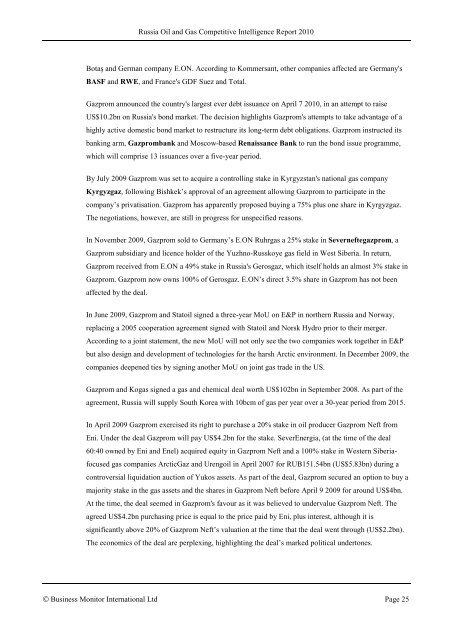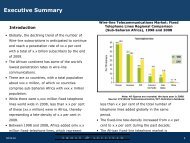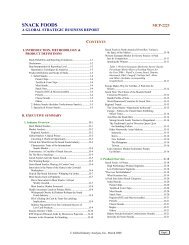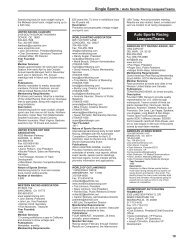the RUSSIA oil & gas competitive intelligence report - Report Buyer
the RUSSIA oil & gas competitive intelligence report - Report Buyer
the RUSSIA oil & gas competitive intelligence report - Report Buyer
You also want an ePaper? Increase the reach of your titles
YUMPU automatically turns print PDFs into web optimized ePapers that Google loves.
Russia Oil and Gas Competitive Intelligence <strong>Report</strong> 2010<br />
Botaş and German company E.ON. According to Kommersant, o<strong>the</strong>r companies affected are Germany's<br />
BASF and RWE, and France's GDF Suez and Total.<br />
Gazprom announced <strong>the</strong> country's largest ever debt issuance on April 7 2010, in an attempt to raise<br />
US$10.2bn on Russia's bond market. The decision highlights Gazprom's attempts to take advantage of a<br />
highly active domestic bond market to restructure its long-term debt obligations. Gazprom instructed its<br />
banking arm, Gazprombank and Moscow-based Renaissance Bank to run <strong>the</strong> bond issue programme,<br />
which will comprise 13 issuances over a five-year period.<br />
By July 2009 Gazprom was set to acquire a controlling stake in Kyrgyzstan's national <strong>gas</strong> company<br />
Kyrgyzgaz, following Bishkek’s approval of an agreement allowing Gazprom to participate in <strong>the</strong><br />
company’s privatisation. Gazprom has apparently proposed buying a 75% plus one share in Kyrgyzgaz.<br />
The negotiations, however, are still in progress for unspecified reasons.<br />
In November 2009, Gazprom sold to Germany’s E.ON Ruhr<strong>gas</strong> a 25% stake in Severneftegazprom, a<br />
Gazprom subsidiary and licence holder of <strong>the</strong> Yuzhno-Russkoye <strong>gas</strong> field in West Siberia. In return,<br />
Gazprom received from E.ON a 49% stake in Russia's Gerosgaz, which itself holds an almost 3% stake in<br />
Gazprom. Gazprom now owns 100% of Gerosgaz. E.ON’s direct 3.5% share in Gazprom has not been<br />
affected by <strong>the</strong> deal.<br />
In June 2009, Gazprom and Stat<strong>oil</strong> signed a three-year MoU on E&P in nor<strong>the</strong>rn Russia and Norway,<br />
replacing a 2005 cooperation agreement signed with Stat<strong>oil</strong> and Norsk Hydro prior to <strong>the</strong>ir merger.<br />
According to a joint statement, <strong>the</strong> new MoU will not only see <strong>the</strong> two companies work toge<strong>the</strong>r in E&P<br />
but also design and development of technologies for <strong>the</strong> harsh Arctic environment. In December 2009, <strong>the</strong><br />
companies deepened ties by signing ano<strong>the</strong>r MoU on joint <strong>gas</strong> trade in <strong>the</strong> US.<br />
Gazprom and Ko<strong>gas</strong> signed a <strong>gas</strong> and chemical deal worth US$102bn in September 2008. As part of <strong>the</strong><br />
agreement, Russia will supply South Korea with 10bcm of <strong>gas</strong> per year over a 30-year period from 2015.<br />
In April 2009 Gazprom exercised its right to purchase a 20% stake in <strong>oil</strong> producer Gazprom Neft from<br />
Eni. Under <strong>the</strong> deal Gazprom will pay US$4.2bn for <strong>the</strong> stake. SeverEnergia, (at <strong>the</strong> time of <strong>the</strong> deal<br />
60:40 owned by Eni and Enel) acquired equity in Gazprom Neft and a 100% stake in Western Siberiafocused<br />
<strong>gas</strong> companies ArcticGaz and Ureng<strong>oil</strong> in April 2007 for RUB151.54bn (US$5.83bn) during a<br />
controversial liquidation auction of Yukos assets. As part of <strong>the</strong> deal, Gazprom secured an option to buy a<br />
majority stake in <strong>the</strong> <strong>gas</strong> assets and <strong>the</strong> shares in Gazprom Neft before April 9 2009 for around US$4bn.<br />
At <strong>the</strong> time, <strong>the</strong> deal seemed in Gazprom's favour as it was believed to undervalue Gazprom Neft. The<br />
agreed US$4.2bn purchasing price is equal to <strong>the</strong> price paid by Eni, plus interest, although it is<br />
significantly above 20% of Gazprom Neft’s valuation at <strong>the</strong> time that <strong>the</strong> deal went through (US$2.2bn).<br />
The economics of <strong>the</strong> deal are perplexing, highlighting <strong>the</strong> deal’s marked political undertones.<br />
© Business Monitor International Ltd Page 25









